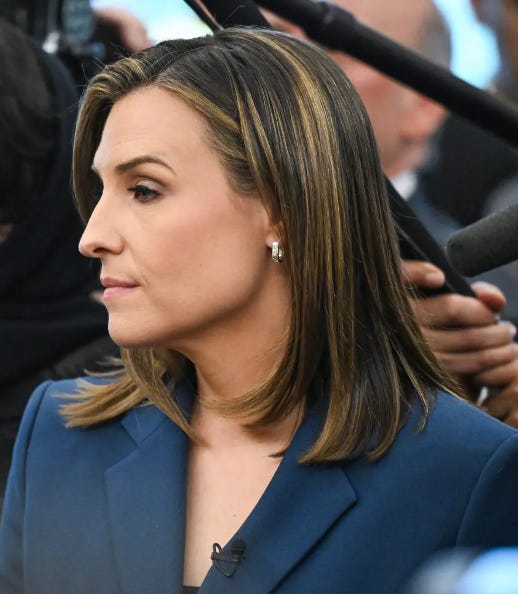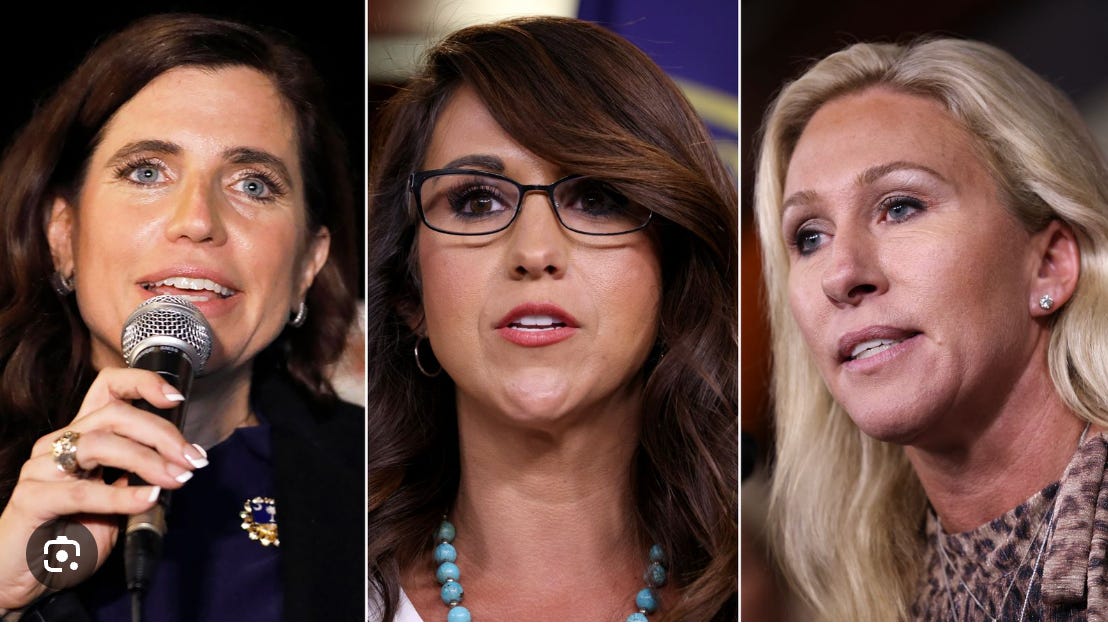Trump’s misogyny may — at last — be catching up with him
Nov 19, 2025

Just over a century ago, in 1920, the 19th Amendment gave women the right to vote in the United States, after an effort that took more than 70 years. And just over half a century ago, in 1963, author Betty Friedan bemoaned the lack of progress for women, writing in “The Feminine Mystique”: “In almost every professional field, in business and in the arts and sciences, women are still treated as second-class citizens.”
Now, we have a president telling Bloomberg’s Catherine Lucey, “Quiet, Piggy,” for asking about the Epstein files, the sordid documents that mention Donald J. Trump multiple times. And we have Trump lecturing another woman that she was “a terrible reporter” for asking questions about the savage 2018 murder of Washington Post writer Jamal Khashoggi and the Epstein papers. The president castigated ABC News journalist Mary Bruce for asking a “horrible, insubordinate and just a terrible question.”


“Insubordinate?” That’s right up there with other phrases Trump has used in dealing with female journalists, as reported by The Atlantic: “Keep your voice down.” “That’s enough of you.” “Be nice; don’t be threatening.” “There was blood coming out of her eyes, blood coming out of her wherever.”
All are reminiscent, too, of an infamous comment by another Republican, then-Senate Leader Mitch McConnell. He silenced Sen. Elizabeth Warren in an argument over and Attorney General nominee in the first Trump term, in 2017, saying: “Nevertheless, she persisted.” That became a rallying cry for feminists.
So, one has to wonder: just how far we have come? And how much are we being set back?
Yes, four of the nine Supreme Court justices are women. And, yes, voters in New Jersey and Virginia installed women as governors earlier this month, for the first time in Virginia. Thirteen states now have women sitting at the same time in their governor’s chairs, something NPR last year celebrated as a new record.
And yet, since 1872 scores of women have sought and been denied the U.S. presidency. This was even after one, Kamala Harris, won the vice presidency and became the second woman, after Hillary Clinton, to carry a major-party banner into elections.
Of course, Trump’s misogyny is an egregious exaggeration. Like so much about the man, it is so extreme as to be aberrant. His history of mistreating women stretches back at least to the 1970s, through the late 1980s when he started palling around with Jeffrey Epstein, into the 1990s, when he assaulted writer E. Jean Carroll, and into the 2000s, when he bragged about grabbing women by the genitals at beauty pageants. At least 27 women have publicly complained about Trump over the years.

But he and his minions are having a corrosive effect on society, certainly in some of our institutions.
Pete Hegseth, the secretary of defense who paid a woman $50,000 to keep quiet after she had accused him of sexual assault, has been driving women out of the military, for instance. After Trump removed Linda Fagan, the admiral who ran the U.S. Coast Guard, Hegseth purged another admiral who was the Navy’s first female chief, reassigned the woman vice admiral who ran the U.S. Naval Academy, fired another female vice admiral who worked with NATO, and pushed out a woman lieutenant general who headed of the Defense Health Agency. Hegseth, who has mandated that every combat soldier meet “the highest male standard” for fitness, also quashed the elevation of a woman slated to head the Navy’s SEAL program. That officer, a captain, had been awarded a Purple Heart for her time in Iraq, during which she was injured in an IED attack, and was the first female troop commander to serve with SEAL Team Six.
Organizations such as the National Organization for Women are documenting the numerous ways that the Trump Administration has been setting women back. These have included mandates that gender not be considered in military academy applications, widespread assaults on diversity and equality efforts, the gutting of the Office of Civil Rights, assaults on the rights of transgender people, and much more.
Even before his election, experts warned about the threats Trump posed to women, setting them the context of the rise of authoritarianism generally. In a November 2024 piece headlined “Why Gender Is Central to the Antidemocratic Playbook: Unpacking the Linkages in the United States and Beyond,” a senior fellow at the Carnegie Endowment for International Peace set Trump’s sexism in a broader context. Saskia Brechenmacher wrote of how “a significant body of evidence shows that right-wing authoritarian views—which are associated with an embrace of traditional values, submission to authority, and a perception that the world is a dangerous place—are linked to both paternalistic attitudes about women (‘benevolent sexism’) and feelings of antipathy toward women who seek equality (‘hostile sexism’).”
Every month since Trump assumed office, it seems, we have seen fresh examples of authoritarian actions – consider the rampages of ICE, the unilateral dismantling of the Department of Education, the firings of government employees, the persecution of political opponents, the harassment of universities, and on and on. And, not coincidentally, we see Trump’s continuing verbal assaults on women.
We have at least three more years during which we’re likely to see more such outrages. Just how much damage will they do?

Still, it seems significant that some women in the GOP appear to be souring on Trump’s vileness. A New York Times opinion writer, Michelle Cottle, wrote of how much of a difference three Republican House members — Lauren Boebert of Colorado, Marjorie Taylor Greene of Georgia and Nancy Mace of South Carolina – have made. They stood up to others in their party and to the president in demanding release of the full Epstein files, forcing Trump to belatedly echo their call.
“Love ’em or hate ’em, these House troublemakers bucked their party leadership, stared down their president and made possible Tuesday’s vote to compel the administration to come clean about the web of degeneracy surrounding Jeffrey Epstein,” Cottle wrote. “This victory speaks to the value of having women’s voices, and strength, inside the Republican echo chamber, a place that can still be tough for women to navigate.”
Might that signal the start of a feminist rebellion or something even broader? Betty Friedan in 1984 struck an optimistic note, writing: “I cry for all the years of women’s struggle and sacrifice to get to this place. I cry for joy and pride at the power that we women have found in ourselves and given to each other to make this moment possible. And I cry with sheer excitement at the amazing grace of it all – the sense of new political hope, of democracy moving again after all the years of cynicism.”
The setbacks that Trump represents – and foments – make such optimism tough now. But, if the three dissident Republican congresswomen signal anything, it’s that the fight isn’t lost yet.
